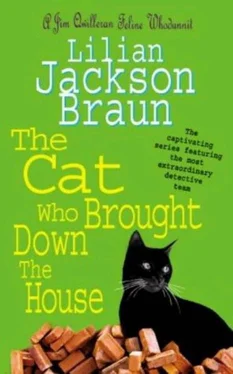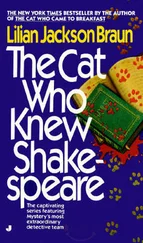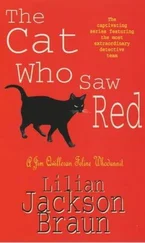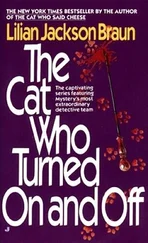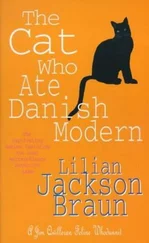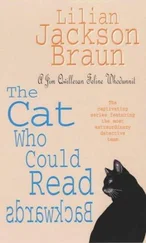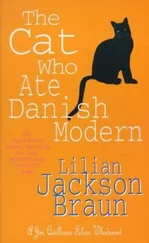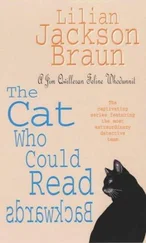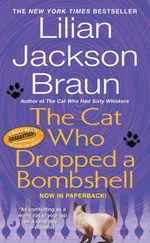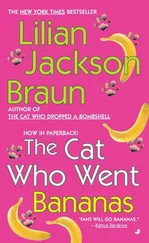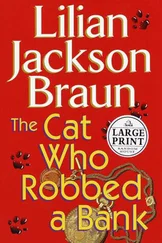Lilian Braun - The Cat Who Brought Down the House
Здесь есть возможность читать онлайн «Lilian Braun - The Cat Who Brought Down the House» весь текст электронной книги совершенно бесплатно (целиком полную версию без сокращений). В некоторых случаях можно слушать аудио, скачать через торрент в формате fb2 и присутствует краткое содержание. Год выпуска: 2003, ISBN: 2003, Издательство: Jove, Жанр: Старинная литература, на английском языке. Описание произведения, (предисловие) а так же отзывы посетителей доступны на портале библиотеки ЛибКат.
- Название:The Cat Who Brought Down the House
- Автор:
- Издательство:Jove
- Жанр:
- Год:2003
- ISBN:9780515136555
- Рейтинг книги:4 / 5. Голосов: 1
-
Избранное:Добавить в избранное
- Отзывы:
-
Ваша оценка:
- 80
- 1
- 2
- 3
- 4
- 5
The Cat Who Brought Down the House: краткое содержание, описание и аннотация
Предлагаем к чтению аннотацию, описание, краткое содержание или предисловие (зависит от того, что написал сам автор книги «The Cat Who Brought Down the House»). Если вы не нашли необходимую информацию о книге — напишите в комментариях, мы постараемся отыскать её.
The Cat Who Brought Down the House — читать онлайн бесплатно полную книгу (весь текст) целиком
Ниже представлен текст книги, разбитый по страницам. Система сохранения места последней прочитанной страницы, позволяет с удобством читать онлайн бесплатно книгу «The Cat Who Brought Down the House», без необходимости каждый раз заново искать на чём Вы остановились. Поставьте закладку, и сможете в любой момент перейти на страницу, на которой закончили чтение.
Интервал:
Закладка:
Qwilleran, although feigning a lack of interest, was beginning to have a nagging curiosity about Thelma Thackeray, and he looked forward to Fran Brodie’s return from California.
The Siamese knew something was about to happen –something important, not alarming. Their dinner was served early; the nut bowls on the coffee table were filled; glasses and bottles appeared on the serving bar. The cats watched the preparations, forgoing their usual postprandial meditation in a sunny spot.
Qwilleran was proud of his bartending skills, and he always served his guests with a fillip of formality. Now he had acquired a round silver tray with the merest suggestion of a fluted rim—just enough to keep it from looking like a hubcap. (He disliked anything ornate.) There were modern trays in aluminum, chrome, and stainless steel, and he had served drinks on them all, but silver had soul. Even the Siamese felt it. They jumped on the bar and looked at their reflections in its highly polished surface. It had been a gift from two of his favorite young people!
At six o’clock Polly Duncan was the first to drive into the barnyard, having come directly from the library. “You have a new tray! It’s quite lovely. I like the piecrust rim. Is it antique? Where did you find it?”
“It was a kind of thank-you from the Bambas. I recommended Lori and Nick when the K Fund was looking for a couple to run the Nutcracker Inn. Let me read you the inscription.”
It was: For Qwill with the compliments of the Nutcracker Inn, where all the nuts go.
Another vehicle pulled up to the kitchen door. The Rikers had come directly from the newspaper office. Mildred was the food editor; Arch was editor in chief and Qwilleran’s lifelong friend. The two men had grown up together in Chicago and were secure enough in their friendship to taunt each other at the slightest provocation.
Mildred noticed the new tray on the bar. “It’s charming! Where did you find it?”
“It was a gift. Glad you approve.”
“It’s not very old,” said Arch, who considered himself an authority on antiques. “And it’s only silver plate.”
“It will do,” Qwilleran said, “until you give me an eighteenth-century sterling tray for my birthday, which happens to be next month, in case you’ve forgotten.”
When drinks were served and they moved to the deep-cushioned sofas around the fireplace. Arch proposed a toast: “To all who slave in the workplace from nine to five—and to those who only do two columns a week.”
There was a quick retort from the author of the ‘Qwill Pen’ column: “If I didn’t write my thousand words every Tuesday and Friday, your circulation would drop fifty percent. By the way, do you have any news in tomorrow’s newspaper?”
“Yes,” Mildred said. “Good news on the food page! Derek Cuttlebrink’s girlfriend and her two brothers in Chicago have purchased the Old Stone Mill, and it will have a new name, a new chef, and a new menu... And Derek will be the manager!”
The other three all talked at once. “Wonderful news!... It’s about time!... There’s nothing like having a Chicago heiress for a girlfriend... I wonder if he’ll stop growing now... I remember him when he was only a six-foot-four busboy and his ambition was to be a cop... The boy’s got charisma!... Wait till his groupies hear the news!... What will the new restaurant be called?”
“The Grist Mill. That was its original purpose. The farmers brought their wheat and corn to be ground into flour.”
Arch said, “I hope they get rid of the phony mill wheel! The millstream dried up fifty years ago, they say, and turning the wheel electrically was a harebrained idea! The mechanical creaking and rumbling and groaning gave the diners indigestion... It drove me crazy!”
“That’s not hard to do,” Qwilleran observed.
The Siamese had not been in evidence during the conversation, and Mildred asked, “Where’s sweet little Yum Yum?”
She was under the sofa, advancing stealthily on Arch’s shoelaces.
“Where’s King Koko?” he asked.
Koko heard his name and appeared from nowhere, walking stiffly on his long, elegant legs. When he had everyone’s attention, he looked haughtily from one to another, then turned and left the room.
“How’s that for a royal put-down?” the editor remarked. The party was in a jovial mood when they left for dinner.
Chapter 3
The depressing old Pickax Hotel was now the upscale Mackintosh Inn—with a life-size portrait of Anne Mackintosh Qwilleran in the lobby, a new interior masterminded by Fran Brodie, and Mackintosh tartan seats in the main dining room. It was now called the Mackintosh Room, and a new chef had made it the finest restaurant in town.
The new maitre d’, being only five-foot-ten, lacked the panache of the six-foot-eight Derek Cuttlebrink, but he knew to seat Qwilleran’s party at the best table.
They were a jovial foursome—middle-aged and comfortable with their lives and with each other. Yet, each had a history that could be told: Jim Qwilleran, after a failed marriage, had succumbed to alcoholism until a miracle got him back on track. Polly Duncan, widowed tragically at twenty-five, had never remarried. Mildred Hanstable Riker, stunned by a disastrous family situation, had survived with her warm heart and generous spirit intact. Arch Riker, after raising a family, had heard his first wife announce, I’d rather be a single antique dealer than a married antique collector.”
When they were seated and the menus were presented, Arch said, “I'd like a big steak.”
His wife said sweetly, “Hon, you can have a big steak when you go to Tipsy’s Tavern. Chef Wingo offers you a chance to expand your gustatory horizons. I think you’d like the garlic-and-black-pepper-marinated strip loin with caramelized onions and merlot-vinegar reduction.”
Arch looked at the others helplessly. “What’s Qwill having?”
His friend said, “Grilled venison tenderloin with smoked bacon, braised cabbage strudel, and Bing cherry demi-glaze.”
Both women were having the seafood Napoleon with carrot gaufrettes and lemon buerre blanc sauce.
The first course was a butternut squash puree served in soup plates with a garnish of fresh blueberries.
Polly remarked, “Do I recognize Mildred’s influence?”
“I told Wingo that blueberries are legendary in Moose County.”
Qwilleran was alerted. He was collecting local legends for his book to be titled Short & Tall Tales. “ Is it one for the book, Mildred? I'd like to tape it.”
“Wonderful!” she said. “Bring your recorder to the opening of the stitchery exhibition on Sunday.”
“What kind of stitchery?” Polly asked.
“Quilting. But not the kind of traditional bed quilts that I used to make. These are wall hangings, large and small, pictorial and geometric. We’re calling it Touchy-Feely Art, and I'll tell you why. A number of years ago I was visiting an art museum in Chicago and trying to examine the brushwork on a certain painting. The security guard tapped me on the shoulder and said, "Stand back eighteen inches. Breathing on the paintings is prohibited." Well! The artwork we’re showing on Sunday can be touched as well as breathed on. Even if you don’t touch the wall hangings, you get a snuggly feeling just by looking at them.”
“Interesting!” Qwilleran said, as he considered the ramifications of Touchy-Feely Art. “You’d better post signs WASH YOUR HANDS.”
Then the entrees were served, and they talked about food for a while. The server had placed a small plate of lemon wedges in the middle of the table.
“What are those for?” Arch asked.
Mildred explained, “Chef Wingo believes a few drops of lemon add piquancy to any dish, hon.”
Читать дальшеИнтервал:
Закладка:
Похожие книги на «The Cat Who Brought Down the House»
Представляем Вашему вниманию похожие книги на «The Cat Who Brought Down the House» списком для выбора. Мы отобрали схожую по названию и смыслу литературу в надежде предоставить читателям больше вариантов отыскать новые, интересные, ещё непрочитанные произведения.
Обсуждение, отзывы о книге «The Cat Who Brought Down the House» и просто собственные мнения читателей. Оставьте ваши комментарии, напишите, что Вы думаете о произведении, его смысле или главных героях. Укажите что конкретно понравилось, а что нет, и почему Вы так считаете.
